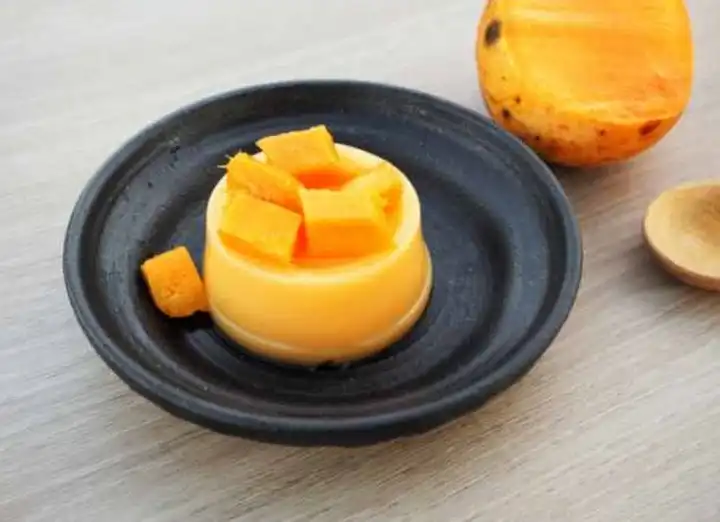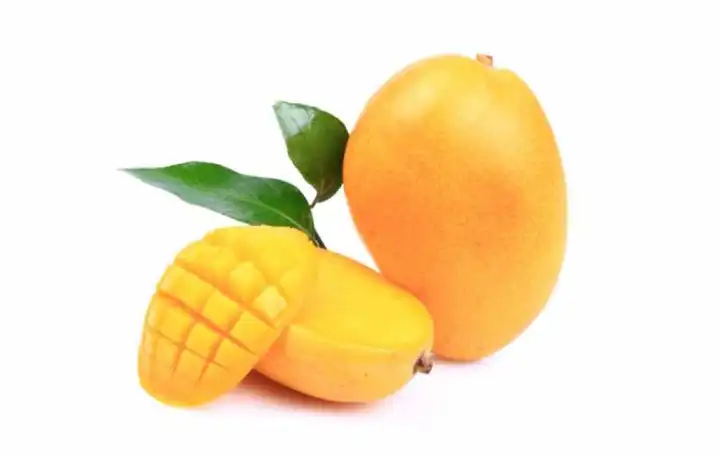Can Puppies Eat Mango? Mango is a tropical fruit that many people around the world enjoy. It’s a sweet, juicy fruit packed with vitamins and minerals. But what about puppies? Can they eat mango too? In this article, we’ll take a closer look at whether or not puppies can safely eat mango.
Can Puppies Eat Mango?

Can Puppies Eat Mango? The short answer is yes, puppies can eat mango. Mango is a healthy and nutritious fruit that can provide a range of benefits for your furry friend. However, as with any new food, it’s important to introduce mango slowly and in moderation.
Some puppies may have allergies or sensitivities to certain foods, and mango is no exception. If your puppy has never eaten a mango, give them a small one and care for any signs of an allergic response. These can include vomiting, diarrhea, or itching. If your puppy shows symptoms, stop feeding them mango immediately and contact your veterinarian.
Is Mango Safe for Puppies?
Mango is generally considered safe for puppies to eat in moderation, but some potential risks of feeding mango to puppies are important considerations to remember.
- First, mango is high in sugar, so it should only be given to puppies as an occasional treat. Too much fruit in a puppy’s diet could lead to obesity or digestive upset.
- Second, preparing the mango properly by removing the skin and pit is important. The pit is unsafe for puppies to eat, as it could cause choking or digestive issues.
- Third, while mango is safe for most puppies, some may have an allergy or intolerance to the fruit. Monitor for signs of vomiting, diarrhea, or other digestive issues after giving your puppy mango. If your puppy shows any signs of discomfort, stop giving them mango and consult with a veterinarian.
- Finally, it’s important to note that while mango can be a healthy treat for puppies, it should not replace a balanced diet. Puppies require a diet specifically designed for their nutritional needs, and too many treats or supplements could disrupt the balance of their diet.
Mango can be a safe and healthy treat for puppies when given in moderation and prepared properly. However, monitoring your puppy’s reaction to mango is important, and consult a veterinarian if you have any concerns about their diet.
How to Feed Mango to Your Puppy

If your puppy tolerates mango well, you can incorporate it into their diet in various ways. Here are a few ideas:
Fresh Mango:
Cut a small piece of mango into bite-sized pieces and offer it to your puppy as a treat. Remove the skin and the pit, as these can be a choking hazard.
Frozen Mango:
Freeze a small mango for a refreshing summer treat. You can mix frozen mango with yogurt or other fruits for a healthy and tasty snack.
Mango Slices:
Frozen mango slices can relieve sore gums if your puppy is teething.
Mango Puree:
Mix fresh or frozen mango with water or low-sodium chicken broth and freeze it in an ice cube tray for a cool and tasty treat.
Benefits of Feeding Mango to Your Puppy

In addition to being a tasty treat, mango can provide your puppy with various health benefits. Here are a few of the key benefits:
Vitamins:
They can support your puppy’s overall health. These include vitamins A, C, and E and potassium, magnesium, and fiber.
Digestive Health:
Mango contains enzymes that aid digestion and promote a healthy gut. This can be especially beneficial for puppies that are prone to digestive issues.
Hydration:
Mango is a juicy fruit that can assist maintain your puppy hydrated. This can be especially important during the hot summer months.
Nutritional value of mango for dogs
Mango is a fruit that is not only tasty but also offers a range of nutritional benefits for dogs. Here are some of the key nutritional benefits of mango for dogs:
Vitamins and minerals:
It contains high levels of vitamin A, important for maintaining healthy eyes and skin, and vitamin C, an antioxidant that can help increase the immune system. Mango also contains potassium, important for maintaining healthy muscles and nerve function, and fiber, which can help improve digestion.
Hydration:
Mango is a juicy fruit that can help keep your dog hydrated, especially during the hot summer. This is important for maintaining proper bodily functions and preventing dehydration.
Antioxidants:
Mango has various antioxidants, including beta-carotene and zeaxanthin, that can safeguard your dog’s cells against harm caused by free radicals. As a result, this may lower the likelihood of long-term illnesses like cancer and heart disease.
Digestive health:
Mango contains enzymes that aid digestion and promote a healthy gut. This can be especially beneficial for dogs that are prone to digestive issues.
Low in fat and calories:
Mango is a low-fat, low-calorie food that can be a healthy dog treat. It is a great alternative to high-calorie snacks that can contribute to obesity and other health issues.
While mango is generally safe and nutritious for dogs, it is important to introduce it slowly and in moderation, particularly if your dog has never had it before. If your dog experiences any signs of an allergic response, such as vomiting, diarrhea, or itching, stop feeding them mango and contact your veterinarian.
Mango supplements for puppies
Mango supplements for puppies are becoming increasingly popular as a way to provide dogs with the nutritional benefits of this tropical fruit. While some supplements on the market contain mango, it’s important to use caution and consult with a veterinarian before adding any new supplements to your puppy’s diet.
However, puppies have different nutritional needs than adult dogs, and adding supplements to their diet can potentially cause harm if not done carefully. Additionally, some supplements may contain other ingredients that could harm your puppy, so it’s important to choose high-quality supplements specifically formulated for puppies.
If you are considering adding mango supplements to your puppy’s diet, it’s best to first consult with a veterinarian. They can help determine if mango is a good choice for your puppy based on their individual needs and health status. They can also recommend a specific supplement and dosage that is safe and appropriate for your puppy.
It’s important to remember that supplements should never replace a balanced and nutritious diet. While mango supplements can be a healthy addition to your puppy’s diet, they should be combined with high-quality puppy food that provides all the necessary nutrients. Working with a veterinarian and providing your puppy with a balanced and nutritious diet can help support their overall health and well-being.
Best mango treats for puppies
Veterinarians recommend carefully selecting mango treats for puppies to ensure they are safe and appropriate for their needs. Here are some of the best mango treats for puppies:
Freeze-dried mango:
Freeze-dried mango is a healthy and convenient option for a mango treat. It removes the mango’s moisture, intensifies the flavor, and creates a crunchy texture. This treat is low in calories and easy to store, making it a great choice for on-the-go snacking.
Mango puree:
You can make your mango puree by blending fresh mango with a little water. This puree can be used as a topping for your puppy’s food or frozen in ice cube trays for a refreshing and nutritious treat. Be sure to use ripe, fresh mango and avoid adding any sugar or other ingredients that could be harmful to your puppy.
Homemade mango dog treats:
You can make your dog treats using mango as the main ingredient. Many online recipes use simple, wholesome ingredients to create tasty and healthy treats that your puppy will love. Be sure to choose a recipe specifically designed for dogs, and avoid using any ingredients that could be harmful or toxic to your puppy.
Mango and yogurt bites:
You can create a healthy and tasty treat by combining fresh mango with plain yogurt. Blend the ingredients and freeze them in ice cube trays. This creates a refreshing and nutritious treat that is high in probiotics and easy to digest.
How to prepare mango for puppies
Preparing mango for puppies can be a healthy and enjoyable experience, provided that it’s done correctly. To ensure that your puppy benefits from all the nutrients of mango, follow these guidelines:
- Choose a ripe mango: Look for a mango that is slightly soft to the touch and has a sweet aroma. Avoid mangoes that are too soft or smell sour, as they may be rotten and pose a risk to your puppy’s health.
- Peel the mango: Using a vegetable peeler or a sharp knife, remove the skin from the mango. Cut off the ends and discard them.
- Remove the pit: Mango pits are not safe for puppies to eat, as they can cause choking or digestive problems. Use a sharp knife to separate the flesh from the pit.
- Cut the mango into small pieces: To make the mango easy to chew and swallow, cut the flesh into bite-sized pieces.
- Serve in moderation: Mango is high in sugar and should only be given to puppies as a special treat. Overconsumption of fruit can lead to digestive issues or obesity.
- Look out for allergy or intolerance symptoms: Although mango is generally safe for most puppies, some may be allergic or intolerant to it. Watch for signs of vomiting, diarrhea, or other digestive problems after giving your puppy mango. If any issues arise, discontinue feeding mango and seek veterinary advice.
Frequently Asked Questions (FAQs)
Can puppies eat mango?
Yes, puppies can eat mango, but it should be introduced slowly and in moderation. Always watch out for any signs of an allergic reaction or digestive issues.
What are the benefits of feeding mango to puppies?
Mango contains vitamins and minerals to support your puppy’s health. It also aids digestion, promotes a healthy gut, and helps keep your puppy hydrated.
Is mango safe for all puppies to eat?
Mango is generally safe for most puppies, but some may have an allergy or intolerance to the fruit. Always monitor for any signs of discomfort, and consult a veterinarian if you have any concerns.
What are the risks of feeding mango to puppies?
The high sugar content in mango means it should only be given to puppies as an occasional treat. Also, preparing the mango properly by removing the skin and pit is important, as the pit is unsafe for puppies to eat and could cause choking or digestive issues.
How can I feed mango to my puppy?
You can feed your puppy fresh or frozen mango in small bite-sized pieces with the skin and pit removed. Mix it with yogurt or other fruits for a healthy and tasty snack.
Can mango replace a balanced diet for puppies?
A: Mango should not replace a balanced diet specifically designed for puppies. Too many treats or supplements could disrupt the balance of their diet.
Conclusion
mango can be a healthy and safe treatment for puppies when consumed in moderation. It’s crucial to introduce new foods slowly and pay attention to your puppy’s reactions. If your puppy responds well to mango, it can be a delicious and nutritious addition to their diet. Just remember to remove the skin and pit and serve the mango in small, bite-sized pieces.



